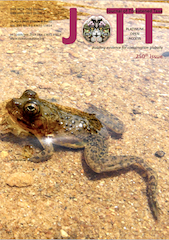The diversity and conservation of mammals in the Dodo Coastal Forest in southwestern Côte d’Ivoire, western Africa: a preliminary study
DOI:
https://doi.org/10.11609/jott.4641.11.6.13654-13666Keywords:
Chimpanzee, encounter rates, gallery forest, King Colobus, river DodoAbstract
To improve the knowledge of non-volant mammal diversity and conservation prospects in the Dodo Coastal Forest (DCF) in southwestern Côte d’Ivoire, we conducted reconnaissance surveys and interviews, and deployed remote cameras. We calculated visual encounter rates (vER) and sign ER (sER) of mammalian taxa and hunting signs, mapped their locations and tested the hypothesis that sightings and signs of primates occurred closer to the river Dodo in and near the gallery forest. We sighted nine taxa, including threatened King Colobus (Endangered, EN), Olive Colobus (Vulnerable, VU), Lowe’s Monkey (VU), the Eastern Lesser Spot-nosed Monkey (VU), and White-bellied Pangolin (VU), with vER of 0.04, 0.12, 0.04, 0.12, 0.04, respectively. We confirmed 14 other taxa with signs including threatened Western Chimpanzee (CR), Pygmy Hippopotamus (Endangered, EN), Bosman’s Potto (VU), and Black-bellied Pangolin (VU), with sER of 0.51, 0.04, 0.08, 0.04, respectively. The most frequently encountered signs were of the Red River Hog at 1.73 signs/km, and the Bushbuck at 0.63 signs/km. Remote cameras captured images of these two taxa at image capture rates (ICR) of 0.044 and 0.022, respectively. Images of the African Buffalo were captured at ICR of 0.044. The 23 confirmed taxa include seven primates, four rodents, three carnivores, six even-toed ungulates, two pangolins and a Tree Hyrax. The mean distance from the river Dodo to the sightings and the signs of the primates was significantly shorter than that of other taxa. This supports our hypothesis. There was a high level of hunting signs (sER = 0.63) indicating that intensive hunting pressure is menacing the fauna. We recommend that authorities take actions against poaching, install a surveillance program, and curtail charcoal-making to ensure the conservation of the threatened mammals of the DCF.Published
Issue
Section
License
Authors own the copyright to the articles published in JoTT. This is indicated explicitly in each publication. The authors grant permission to the publisher Wildlife Information Liaison Development (WILD) Society to publish the article in the Journal of Threatened Taxa. The authors recognize WILD as the original publisher, and to sell hard copies of the Journal and article to any buyer. JoTT is registered under the Creative Commons Attribution 4.0 International License (CC BY), which allows authors to retain copyright ownership. Under this license the authors allow anyone to download, cite, use the data, modify, reprint, copy and distribute provided the authors and source of publication are credited through appropriate citations (e.g., Son et al. (2016). Bats (Mammalia: Chiroptera) of the southeastern Truong Son Mountains, Quang Ngai Province, Vietnam. Journal of Threatened Taxa 8(7): 8953–8969. https://doi.org/10.11609/jott.2785.8.7.8953-8969). Users of the data do not require specific permission from the authors or the publisher.





